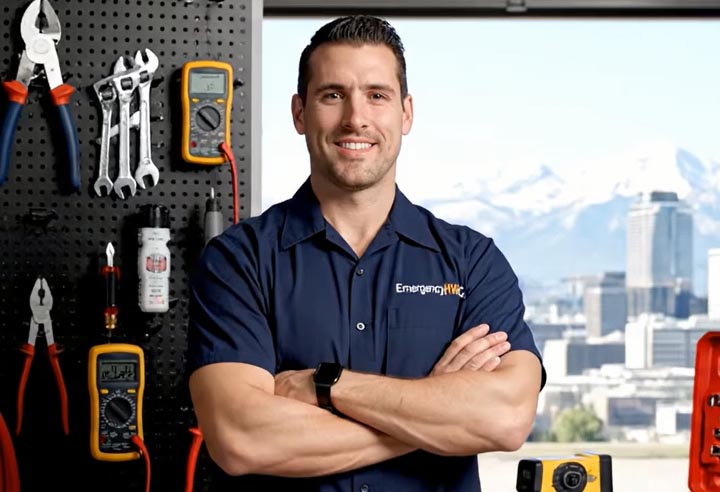Connecting homeowners in Denver to hydronic professionals specializing in steam and radiant as well as high-efficiency boiler repairs, licensed to operate in 80206, 80205, and throughout the Denver Metro area.
In Denver, when a boiler breaks, it is more than just an inconvenience. It can also lead to a rapid freeze scenario. At 5,280 feet, the altitude may cause issues with repair and maintenance of the boiler due to the high rates of inefficient combustion as well as the mineral-heavy water (180+ ppm hardness).
EmergencyHVACs’ network deploy only Colorado-licensed technicians that know the difference in care that is needed for a cast iron heating system in Capitol Hill and a high-efficiency condensing heating unit in the Highlands.
From frozen condensate lines in Washington Park to heat exchangers in Five Points that have suffered from cracking, our networked partners have the gaskets, pumps, and altitude-calibrated sensors to restore heat on the spot.
Not an emergency? For standard installations and general system information, visit our General Boiler Service & Installation page.
Why Denver Boilers Fail (And How We Fix Them)
Repair efforts that are generic fail far too often in Colorado. Network engineers determined the primary causes of the failures of the Denver boilers. They are Richard Ruiz (Systems Engineer), and Philip Wyatt (Cast Iron Specialist).
| Issue | The Problem | Our Fix |
|---|---|---|
| 1. The “Altitude Choke” | Because of the 16% lower air density, standard boilers run “rich,” which cause the heat exchanger to soot and trigger a Carbon Monoxide (CO) shutdown. | The technicians recalibrate the gas orifices and air-intake ratios specifically for the 5,280 ft elevation to achieve a 85% efficiency and above. |
| 2. The “Scale Attack” | Denver has a water hardness of 180 ppm at the average. This causes a calcium carbonate sludge which can kill the circulator pumps and cause things like “kettling” ( which are like banging noises). | We are protective of the longevity of your system by using magnetic filtration and Nalco-grade descaling flushes to remove that sludge. |
| 3. Frozen Pipe Bursts | Older masonry homes like in Park Hill experience sub-zero nights, which results in bursting hydronic lines in uninsulated crawl spaces. | Rapid freeze-seal repair and glycol injections to prevent future bursts. |
Service Area: Neighborhood-Specific Dispatch
We serve Denver Differently. We have partnered with and mobilized local experts and technicians who are able to respond to requests from the city’s historical and modern districts. Choosing the right technician that specializes in your home’s era is essential.
| Neighborhood | Common Boiler Types We Service | Typical Issues We Fix |
|---|---|---|
| Capitol Hill / Congress Park | Gravity Steam & Cast Iron Radiators (1900-1940s) | Steam vents, tridicator gauges, asbestos-safe valve handling, pilot instability. |
| Highlands / LoHi | Retrofitted Mini-Splits + Boilers (Bungalows) | Zone valve failures, smart thermostat integration, pressure relief valves. |
| Park Hill / Stapleton | Mid-Century Hydronic Baseboards | Airlocks in upper floors, uneven heating zones, frozen pipes. |
| Cherry Creek / Wash Park | High-Efficiency Condensing Boilers (Lochinvar/Viessmann) | Condensate line freezing, erratic error codes, altitude sensor failure. |
Meet Our Denver Network Experts
We do not send people lacking experience. We connect you with career professionals who have a documented experience in the specific heating ecosystem of Denver:
- Philip Wyatt (Network Partner): 38 years old. Specialist in historic Cast Iron Boiler restoration and preservation in Congress Park.
- Richard Ruiz (Network Partner): Senior Systems Specialist. Expert in commercial and high-capacity residential boiler redundancy and “Design Day” ( -10°F) calculations.
- Antonio Booth (Network Partner): Licensed HVAC professional who focused on Park Hill Dual-Fuel Heat Pump/Boiler Integrated Efficiency Upgrades.
Recent Denver Boiler Rescues (Case Studies)
See Our Network Professionals Solve Denver’s Toughest Heating Challenges:
- Clayton St Restoration(Congress Park, Denver, CO 80206): Bringing back to life a 1908 Denver Square cast-iron boiler (restoring 15% efficiency) without replacing that vintage piece.
- Emergency Medical Center Retrofit(Aurora area, Denver, CO 80220): How Richard Ruiz restored heat to a critical facility in East Central Denver during a -10°F freeze event.
- Park Hill Efficiency Upgrade(Denver, CO 80205): Converting a 1965 gravity system to a hybrid Heat Pump/Furnace solution, that results in 39% savings for the homeowner.
- Highlands Bungalow Retrofit(Denver, CO 80211): Integrating ductless mini-splits with existing heating for a 1928 historic home.
Denver Boiler Repair Pricing (2025 Estimates)
| Service | Estimated Cost Range* |
|---|---|
| Circulator pump replacement | $700 – $1,500 |
| Heat exchanger cleaning/descaling | $300 – $600 |
| Gas valve/ignitor repair | $300 – $500 |
| Pressure relief valve replacement | $150 – $300 |
| System leak sealing | $200 – $600 |
| Average Emergency Call | $550 (includes diagnosis) |
*Prices vary by boiler make, model, and severity of the emergency.
FAQ: Boiler Repair in Denver
What is the price of getting a boiler repaired in Denver?
Cost of boiler repair in Denver is typically between $200 to $1,200. Less complicated repairs like thermostats and pressure valves will cost around $200, and more expensive repairs like circulator pumps will cost around $1,500. Emergency repairs cost about $550 on average because of altitude-related parts and emergency safety protocols.
Is a permit necessary to get a boiler installed in Denver?
Yes. Every Denver municipality requires permits to be obtained for all boiler installations and replacements, as well as getting registered to with the Colorado State Boiler Inspection Program. Our network of specialists will take care of all paperwork and even scheduling the inspections.

